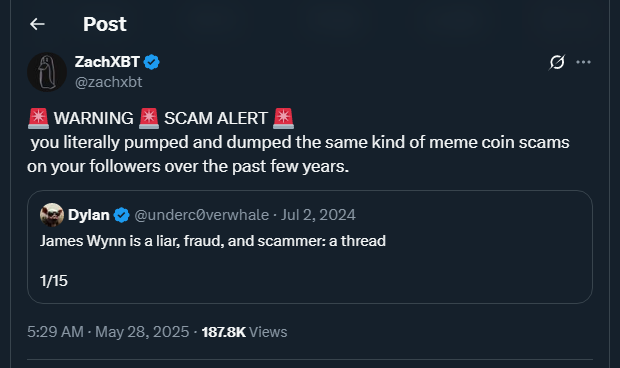TL;DR
- Renowned blockchain researcher ZachXBT has publicly pointed to James Wynn, a well-known high-risk trader at Hyperliquid, for alleged deceptive practices in promoting and selling memecoins.
- Despite repeatedly warning about fraudulent tokens bearing his name, blockchain records clearly link Wynn to “pump and dump” schemes and unethical multi-million dollar profits.
- His extensive history reveals strong connections with Alameda Research and massive movements of PEPE coin, increasing widespread distrust about his integrity within the crypto ecosystem.
Blockchain researcher ZachXBT has shaken social media after exposing James Wynn, a trader known for extremely high-leverage bets on Hyperliquid, for alleged contradictory and non-transparent actions in the cryptocurrency world. According to ZachXBT, Wynn—who recently publicly denounced a group for using his name to launch fraudulent tokens—may have engaged in similar activities himself, promoting and then dumping low-cap memecoins to gain quick, sizable profits.
Wynn Under Suspicion for Promoting and Selling Memecoin Tokens
The controversy erupted after Wynn warned his followers about a new token linked to his name, calling it a “scam” and suggesting that a group he called “the cabal” was behind the suspicious launch. However, ZachXBT responded with clear blockchain evidence suggesting that Wynn had previously participated in similar moves, including promoting the BabyPepe token, for which he requested a 2% private allocation and later sold for $68,000 after a brief announcement on his Telegram channel.
This does not seem to be an isolated case. He has also been linked to other tokens like ELON and WYNN, whose ties to his identity are hard to ignore. Additionally, Arkham Intelligence records reveal that Wynn recently transferred over 443 billion PEPE tokens to Binance, just before taking a risky 40x leveraged long position on Bitcoin, raising strong suspicions of a possible strategic “dump.”
Connections with Alameda and Questionable Profits
Beyond his market moves, Wynn’s figure becomes even more controversial due to his alleged connection with Alameda Research, the sister company of FTX, now bankrupt. According to Sunil Kavuri, an activist supporting FTX creditors, Wynn reportedly received 6,000 ETH in 2020 from Alameda, funds that he possibly used to leverage his memecoin operations. This fuels the theory that Wynn operated with insider information or resources stemming from unclear and possibly illegal practices.

Despite his public speeches about ethics and decentralization, his rejection of offers from centralized exchanges, and his defense of Hyperliquid as a reliable solution, Wynn’s actions reveal deep contradictions that the crypto community should seriously consider. Far from condemning the ecosystem, these episodes highlight the urgent need for greater transparency and active participation by users in monitoring influential public figures.











